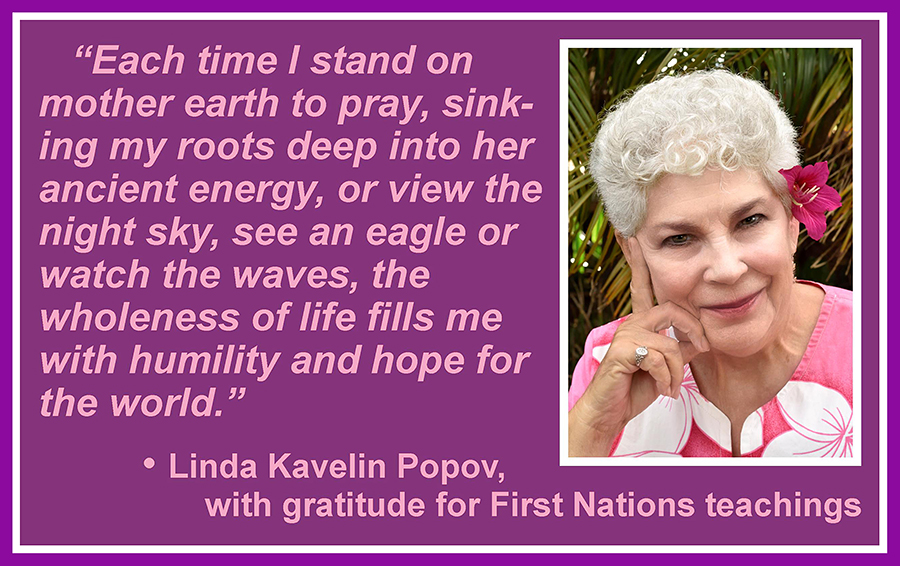|
Linda Kavelin Popov’s done it again. A frequent contributor to these columns, Linda is co-founder of The Virtues Project and a psychotherapist who draws widely from the world’s religious and cultural traditions to promote community healing (see www.lindakavelinpopov.com). This week she is sharing with us some of her reflections on First Nations virtuous wisdom that has filled her with hope for a troubled world.
You’ll recall that last week’s column featured wildfire specialist Rick Arthur’s appreciation for Indigenous wisdom in using low-intensity fires intentionally to avoid megafires, such as the one that destroyed the town of Lytton, B.C., recently.
Well, wildfires aren’t limited to forests, fields and buildings. Society has its own “wildfires,” and Linda credits First Nation Elders with the wisdom to bring hope and healing. I asked her if she’d like to share with us about the impact of their wisdom on her. She responded:
JUST BEFORE COMPLETING the first book of The Virtues Project, The Family Virtues Guide, I meditated on what to do with the book, which my husband Dan researched, I wrote and my brother John Kavelin, a Disney Imagineer, designed. The inner voice said, “First Nations first.”
The very next day a call came in from Francis Dick, prominent artist and training director for the Tsawataineuk people of Kingcome Inlet, B.C. “Will you bring the virtues to our people?” We soon learned that our role was to help Indigenous people to reignite and reclaim their rich cultural heritage of virtues, their traditional courage, unity, generosity and compassion, and to heal the abuses of residential school and White supremacy.
We also became their willing students. Their teachings opened, expanded and deepened our world view: the oneness, wholeness and sacredness of life. All sentient beings are connected. Nature is Creator’s great provider and teacher and requires infinite respect and care. Each living thing has a special spirit or gift. We need to be exquisitely aware of and responsible for our impact on nature and its presence to us.
A Tlingit Elder told us, “Life is for learning our lessons, and the virtues are the lesson plans.” This clarified one of the Virtues Project’s strategies: to “Recognize Teachable Moments.”
A Tahltan medicine man taught me a new depth of spirituality, where everything matters: thoughts, words, and actions. He said, “Do you want to be driven or do you want to be led?” To me that meant, do you choose ego or do you choose to be guided by Spirit? To push or to trust? To purify one’s being, eliminate clutter and excess. “Strive for simplicity,” he told me when visiting my office overfilled with post-its and plans.
I remember this wisdom. Each time I stand on mother earth to pray, sinking my roots deep into her ancient energy, or view the night sky, see an eagle or watch the waves, the wholeness of life fills me with humility and hope for the world.
—Linda Kavelin Popov
LINDA IS THE AUTHOR of seven books, all of which focus on virtues in life, parenting, dying, or dreaming. Her novel, A Scent of Sage, is based on her experiences with Canadian First Nations and “is dedicated to First Nations residential school survivors of Canada, who have taught me much about soul retrieval after generations of trauma, and the deep need to honor culture and tradition.”
© 2021 Warren Harbeck
JoinMe@coffeewithwarren.com
Return to Coffee With Warren home page
|

